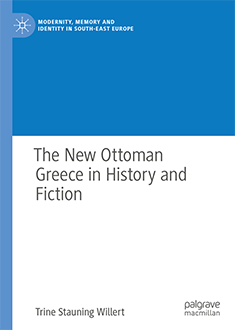Greek Literature between Ottoman Heritage and European Orientation, 1880 to the Present
The project aims at examining contemporary Greek literary representations of cultural and social identities in the period of Ottoman rule and situate them with the broader context of identity discourses in Greece. In the background of earlier writers’ efforts not only to come to terms with the pre-national Ottoman past but also to inscribe Greek letters into a European or more broadly Western literary tradition this project analyzes several contemporary historical novels (1989-2011) along thematic categories such as ‘historical truth and the truth of others, ‘lost homelands and nostalgia’, ‘co-existence and cosmopolitanism’, and ‘the European context – east and west’.
 Through in-depth analyses of recent historical novels, the project focuses in particular on how the novels’ representation of characters and living conditions in the Ottoman societies can be interpreted as comments on contemporary society by using the past either as a mirror or an explanation of problems in the present or as a source of a longed-for model of society be it from a national group perspective or a supra-national (multi-cultural/cosmopolitan or imperial) perspective.
Through in-depth analyses of recent historical novels, the project focuses in particular on how the novels’ representation of characters and living conditions in the Ottoman societies can be interpreted as comments on contemporary society by using the past either as a mirror or an explanation of problems in the present or as a source of a longed-for model of society be it from a national group perspective or a supra-national (multi-cultural/cosmopolitan or imperial) perspective.
The monograph The New Ottoman Greece in History and Fiction (2019) explores the increasing interest in the Ottoman past in contemporary Greek society and its cultural sphere. It considers how the changing geo-political balances in South-East Europe since 1989 have offered Greek society an occasion to re-examine the transition from cultural diversity in the imperial context, to efforts to homogenize culture in the subsequent national contexts. This study shows how contemporary immigration and better relations with Turkey led to new directions in historiography, fiction and popular culture at the beginning of the twenty-first century. It focuses on how narratives about cultural co-existence under the Ottoman rule are used as a prism of national self-awareness and argues that the interpretations of Greece’s Ottoman legacy are part of the cultural battles over national identity and belonging. The book examines these narratives within the context of tension between East and West and, not least, Greece’s place in Europe.
The monograph The New Ottoman Greece in History and Fiction (2019) explores the increasing interest in the Ottoman past in contemporary Greek society and its cultural sphere. It considers how the changing geo-political balances in South-East Europe since 1989 have offered Greek society an occasion to re-examine the transition from cultural diversity in the imperial context, to efforts to homogenize culture in the subsequent national contexts. This study shows how contemporary immigration and better relations with Turkey led to new directions in historiography, fiction and popular culture at the beginning of the twenty-first century. It focuses on how narratives about cultural co-existence under the Ottoman rule are used as a prism of national self-awareness and argues that the interpretations of Greece’s Ottoman legacy are part of the cultural battles over national identity and belonging. The book examines these narratives within the context of tension between East and West and, not least, Greece’s place in Europe.

- A title in the book series Modernity, Memory and Identity in South-East Europe
2019. “Ottomanizing the Greek Past in Popular Literature” in: Re-Telling the Past. History in Contemporary Greek Literature, Film, and Popular Culture, T. Staunning Willert and G. Katsan (eds.). Lanham: Lexington Books.
2019. “Nostalgic Visions of the Greek Countryside in Times of Crisis: National Idyll, Personal Fulfilment or Rescuing the Ecosystem” in: Greece in Crisis. The Cultural Politics of Austerity, Dimitris Tziovas (ed.). London: I.B. Tauris.
2018. “Everything Has Its Place in God’s Imaret’: Nostalgic Visions of Co-existence in Contemporary Greek Historical Fiction” in: Catharina Raudvere (ed.) Nostalgia – Loss and Creativity. Political and Cultural Representations of the Past in South-East Europe (Modernity, Memory and identity in South East Europe). London: Palgrave Macmillan.
2016. “Osmannertiden: En ny græsk guldalder”, Sfinx, vol. 39: 31-35.
“Religious, National, European or Multi-Cultural Awareness: The Religious Education Class as Cultural Battlefield in Greece” in: Sites and Politics of Religious Diversity in Southern Europe, Ruy Blanes and José Mapril (eds.). Leiden: Brill.
2012 with Lina Molokotos-Liederman eds. Innovation in the Orthodox Christian Tradition. The Question of Change in Greek Orthodox Thought and Practice. Farnham: Ashgate.
2012 with Catharina Raudvere and Krzysztof Stala eds. Rethinking the Space for Religion. New Actors in Central and Southeast Europe on Religion, Authenticity and Belonging. Lund: Nordic Academic Press.

